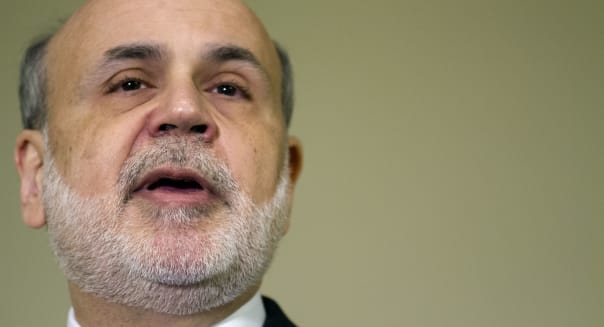Bernanke Wishes He’d Done a Better Job Explaining the Financial Crisis Bailouts
Filed under: Economic Recovery, U.S. Government, Economy, Breaking News

Former Federal Reserve Chairman Ben S. Bernanke said Tuesday that the central bank should have explained more effectively that bailouts during the financial crisis would help people outside the finance industry.
“My natural inclinations, even if it weren’t for the legal mandate, would be to try to help the average person,” Bernanke said in his first public remarks since leaving the Fed in January, referring to the central bank’s mandate from Congress to ensure full employment and stable prices. “The complexity though arises because in order to help the average person, you have to do things — very distasteful things — like try to prevent some large financial companies from collapsing.”
Bernanke guided the economy through the financial crisis that brought down Lehman Brothers and the longest recession since the Great Depression — events that he characterized in a speech in Abu Dhabi as “very, very dark hours.” He responded with $3.3 trillion in emergency lending to financial institutions, including aiding the rescue of Bear Stearns and American International Group. “The natural reaction from the guy on Main Street is ‘how come you’re bailing them out and not bailing me out?’ ” Bernanke said. “By preventing the system from collapsing, we’re protecting the economy, we’re protecting you. But it’s a complicated argument to make, and I don’t think we always made it as well as we could have.”
Target Interest Rate Pushed Down, Lots of Bonds Purchased to Stimulate Economy
Bernanke initiated an unprecedented stimulus campaign, lowering the Fed’s target interest rate to zero in December of 2008 and introducing an era of bond buying known as quantitative easing. The jobless rate climbed as high as 10 percent in October 2009, and with the economy slow to heal, Bernanke initiated a second and third round of bond purchases, which have expanded the Fed’s balance sheet to a record $4.16 trillion. “The result was there are still many people after the crisis who still feel that it was unfair that some companies got helped and small banks and small business and average families didn’t get direct help,” Bernanke said. “It’s a hard perception to break.”
In December, during his second-to-last meeting of the policy making Federal Open Market Committee, Bernanke began to wind down his stimulus campaign, slowing the pace of bond purchases to $75 billion a month from $85 billion, and charting a course of further “measured” reductions at each Fed meeting. In January, the committee cut the pace of purchases again, this time to $65 billion a month. U.S. household wealth has recovered from the crisis, Bernanke said. Janet Yellen, who served as Fed vice chair under Bernanke, became leader of the Fed in February. In testimony before Congress last month she said she expects “a great deal of continuity” as she takes over where Bernanke left off.
Bernanke’s address marks his public debut after he concluded his eight years at the head of the central bank on Jan. 31. He will speak Wednesday in Johannesburg and March 7 in Houston, and he is working on a memoir. He said that it had been “very hard” for him to adjust to a world where, as Fed chief, his words were closely dissected. “It’s one of the reasons I’m looking” forward to life as a former central banker, he said.
Economic Impact of ‘Unseasonably Cold’ Weather Is Being Studied
As Bernanke departed, the Fed faced the challenge of ascertaining how much of recent economic weakness is because of unusually harsh winter weather. Labor Department data showed weaker-than-forecast payroll growth for two consecutive months. Sales at U.S. retailers declined in January by the most since June 2012 and housing starts slumped by the most in almost three years, according to a Commerce Department report.
“Unseasonably cold weather has played some role,” Yellen said in response to a question from the Senate Banking Committee on Feb. 27. “What we need to do, and will be doing in the weeks ahead, is to try to get a firmer handle on exactly how much of that set of soft data can be explained by weather and what portion, if any, is due to softer outlook,” she said.
Permalink | Email this | Linking Blogs | Comments
http://www.dailyfinance.com/2014/03/04/bernanke-financial-crisis-bailout-regrets/
